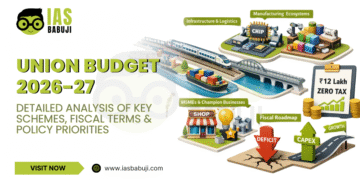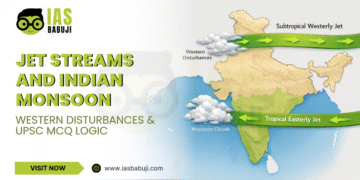Civil Service Exam (IAS Exam) conducted by UPSC is considered to be the toughest exam in India. Despite its toughness, it can be cleared with proper preparation. UPSC syllabus is the most important part of preparation. Moreover, the syllabus is like the tip of the iceberg floating in the ocean of information and knowledge. Above all, aspirants should know the syllabus in-depth to understand the gravity of the exam. To clarify IAS Mains Paper is a descriptive exam. As a result, candidates have to write long answers. Consequently, there is a list of UPSC Mains Subjects to choose from for the optional paper. The following article will give a detailed description of IAS Mains Paper and UPSC Mains Syllabus PDF.

UPSC Mains Syllabus PDF
Subsequently, this article will provide you with the entire syllabus of the IAS Mains Paper. To understand the syllabus aspirants firstly need to thoroughly go through the exam procedure of UPSC CSE. All the how-to and whats regarding UPSC Mains will be further explained.
Overview of the IAS Exam
The Civil Service Exam is conducted in three different stages. Firstly, UPSC Prelims Paper (objective ). However, it’s the qualifying stage for Civil Services. Secondly, UPSC Mains Paper (descriptive). Thirdly, the final Interview Test (personality test). Consequently, candidates who have qualified for the prelims are allowed to attempt the mains and the interview test. Final marks for merit are counted considering marks of both mains and interview test.
What is UPSC Mains Exam?
IAS Mains Paper is the second step of the Civil Service Examination. Consequently, this is a descriptive type of exam. In other words, candidates have to write long answers. For instance, this exam tests the knowledge, awareness, and concept clarity of the aspirants. In addition, the ability of the candidate to answer considering all the aspects of the topic in a limited time is judged. On the other hand, only the qualifying candidates of the prelims exam are allowed to attempt the mains exam. Certainly, to clear this stage the aspirants require a proper strategy. However, understanding fundamental concepts and good answer writing skills are needed. In conclusion, thorough knowledge of Current Affairs and revision is the key to crack this stage.

UPSC Mains Papers
UPSC CSE Mains have 9 papers in total. These papers are divided into 2 categories;
- Qualifying Papers.
- The papers to be counted for merit.
| Qualifying Papers: | Marks | |
| Paper-A | (One of the Indian Language to be selected by the candidate from the Languages included in the Eighth Schedule to the Constitution) | 300 |
| Paper-B | English | 300 |
Papers to be counted for merit: | ||
| Paper-I | Essay | 250 |
| Paper-II | General Studies-I (Indian Heritage and Culture, History and Geography of the World and Society) | 250 |
| Paper-III | General Studies -II (Governance, Constitution, Polity, Social Justice and International relations) | 250 |
| Paper-IV | General Studies -III (Technology, Economic Development, Bio-diversity, Environment, Security and Disaster Management) | 250 |
| Paper-V | General Studies -IV (Ethics, Integrity and Aptitude) | 250 |
Optional Papers: | ||
| Paper-VI | Optional Subject – Paper 1 | 250 |
| Paper-VII | Optional Subject – Paper 2 | 250 |
| Sub total (Written test) | 1750 | |
| Personality Test | 275 | |
| Grand Total | 2025 |
Language options for the qualifying paper.
- Assamese
- Bengali
- Bodo
- Dogri
- Gujarati
- Hindi
- Kannada
- Kashmiri
- Konkani
- Maithili
- Malayalam
- Manipur
- Marathi
- Nepali
- Odia
- Punjabi
- Sanskrit
- Santhali
- Sindhi
- Tamil
- Telugu
- Urdu
- English.
List of UPSC Mains Subject (Optional)
Paper VI & Paper VII are both optional subject papers.
Following is the list of UPSC Mains Subjects to choose from, for the optional subject paper.
- Agriculture
- Animal Husbandry & Veterinary Science
- Anthropology
- Botany
- Chemistry
- Civil Engineering
- Commerce & Accountancy
- Economics/ Electrical Engineering
- Geography
- Geology
- History
- Law
- Management
- Mathematics
- Mechanical Engineering
- Medical Science
- Philosophy
- Physics
- Political Science & International Relation
- Psychology
- Public Administration
- Sociology
- Statistics
- Zoology
- The literature of any one of the following languages: Assamese/Bengali/Bodo/Dogri/Gujarati/Hindi/Kannada/Kashmiri/Konkani/Maithili/Malayalam/Manipur/Marathi/Nepali/Odia/Punjabi/Sanskrit/Santhali/Sindhi/Tamil/ Telugu/Urdu/English.

Points to remember
- Need for a minimum of 25% of marks in each qualifying paper to qualify.
- The marks obtained in these papers will not be considered in counting for ranking.
- The papers on Indian Languages and English will be of Matriculation standards and will be of qualifying nature only.
- The candidates will have to answer the English and Language papers in English and the respective Indian language.
- Each paper will have a time duration of 3 hours each.
- Visually disabled candidates will be given 20 minutes extra for each paper.
Why to read the syllabus?
Importance of UPSC Mains Syllabus PDF
The syllabus is a document that outlines the basic elements of a course. Moreover, it’s a planning tool. IAS Mains Syllabus is an ocean of topics. Above all, thanks to the Union Public Service Commission to provide candidates with a gist of the syllabus to guide the aspirants in the right direction. Certainly, it the very crucial for the candidates to know what to study when it comes to competitive exams like the IAS Exams. Furthermore, UPSC Mains has static and dynamic syllabus. So getting to know the syllabus in depth is the first step of preparation. To sum up, UPSC Mains Subjects are a combination of a wide range of topics ranging from history to geography, polity, science, and furthermore.
Analysis of IAS Mains Syllabus
IAS Mains Syllabus is moreover based on its papers. Therefore there are a Total of 358 Topics in which the whole UPSC syllabus is divided. It includes Mains, Prelims, and Interview test. As a result, these Topics are spread into 14 Subjects. To clarify each paper comprises in-depth topics relating to a particular subject. Moreover, there are 2 qualifying papers which are both language papers. Certainly, these are at a basic level. UPSC trends to ask questions related to current events. So, candidates should know about the burning socio-economic themes. Above all case studies add a bright look to the answer therefore it’s important to use the references wisely.
Firstly, Paper-I is an essay paper. Hence, topics are based on the general global issues. Secondly in Paper-II, questions from Governance dominate the paper. Therefore, it is advised to cover the topic wise IAS syllabus along with the preparation of current affairs. Thirdly, aspirants find Paper-III is generally easier than Paper-II. Moreover, in Paper-IV, the previous years’ sample papers give an edge to the aspirants. It is an aptitude based paper.
UPSC Mains Syllabus PDF
The following link will provide information about the optional paper subjects:-
UPSC Optional Subjects – List of Subject Paper and Syllabus
Key Elements for IAS Mains Preparation.
UPSC Mains Syllabus PDF
A complete guide to the IAS Mains Syllabus. Syllabus understanding is most important. This syllabus will help you in starting your preparation for the exam and organize your schedule accordingly.
UPSC Mains Optional Subject
Certainly, It’s very important to choose the mains optional subject beforehand. Aspirants need to start their optional subject preparation along with other subjects to complete the syllabus in time.
Timetable
Setting up a strict timetable is necessary for every aspirant. Subsequently, a scheduled time for studies will help candidates to make optimum utilization of their time and cover the entire syllabus.
Previous Year Papers
Above all, aspirants should keep practicing previous year papers to get a hold of the exam pattern. Paper solving will help in completing the paper in time. In short, It will help to understand the types of questions that UPSC asks. Also, help in strategy planning
Mock Tests
Mock tests are really important to keep a competitive check on yourself. Above all, they will help in getting confidence in candidates and bring out the best in them.
Current Affairs
Current Affairs are a crucial part of UPSC. Furthermore, it helps to stay updated and alert. Certainly, Current Affairs in mains answers is a huge point scorer. In addition, it enables a better understanding of the concepts. For instance, aspirants can get a hold of the current event through many sources

FAQs | UPSC Mains Syllabus PDF
Reading the syllabus is the first step for the preparation of UPSC EXAM/ IAS EXAM. Moreover without a syllabus, one would not know where to start.
The vast syllabus, the three-tier filtration process makes it one of the toughest exams. There are many myths about UPSC CSE. However, a focused, dedicated, and sincere aspirant can definitely crack this exam. ALL THE BEST!!
Geography, History, Psychology, Public Administration, and Sociology are the most common and most favored subjects in UPSC Mains. These are very easy to understand topics. Subsequently, also cover the majority of the GS Papers topics.
The subject with the least syllabus in UPSC is Anthropology.
Easy access to the NCERT Books through this link:- UPSC NCERT Books 2020 – Complete List with Download Option
Editor’s Note | UPSC Mains Syllabus PDF
IAS Exam is one of the hardest exams to crack. Therefore it is necessary to adopt the best preparation strategy. A thorough study of the syllabus is the first step of strategic planning to excel at this exam. With the detailed syllabus provided in this article, you can start your preparation without any delay. BEST OF LUCK!!







